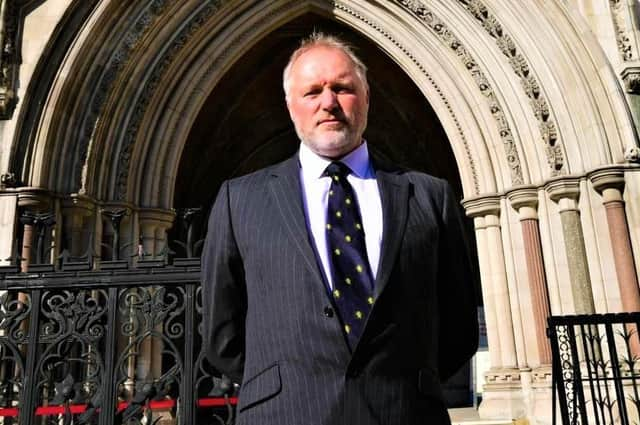PSNI mulling over landmark judgement on recording non-criminal acts which people find offensive


For years now, the PSNI and other forces across the UK have been logging the details of such incidents on their police database, despite them falling short of being crimes.
Click here: Non-criminal ‘hate incidents’: PSNI must beware of policing thought says ex-chief superinterndent
Advertisement
Hide AdAdvertisement
Hide AdThese could be cases in which someone complains about “offensive” posts on social media, for example.
In 2020/21 the PSNI logged 2,493 “hate incidents” (mainly of a sectarian or racist nature).
Of that, 1,757 were recorded as actual crimes; 736 were not.
LIMERICK SPARKED COURT BATTLE:
This week’s judgement from London’s Court of Appeal has called into question the whole process of recording non-criminal activity.
Advertisement
Hide AdAdvertisement
Hide AdThe case was taken by Harry Miller, an ex-police officer, who had re-tweeted a limerick about transgenderism.
This limerick mocked the idea that people can fully transform from male to female, stating that regardless of surgery a man’s genes will always remain male.
Someone complained to Humberside Police about it and officers then logged it as a “hate incident” – recording on the police database that “these comments are designed to cause deep offence and show his hatred for the transgender community”.
According to court documents, an officer was also dispatched to Mr Miller’s workplace.
Advertisement
Hide AdAdvertisement
Hide AdWhen he could not be found there, the officer got hold of him by phone and “strongly advised Mr Miller to cease tweeting” about transgender issues.
‘WE WILL REFLECT ON THIS’:
The police’s actions had already been ruled unlawful last year.
And now the Court of Appeal has found that the guidance many police forces were using, setting out how to deal with such non-criminal “offensive” acts, “clearly constituted a real and significant interference with the right to freedom of expression”.
The court said such non-crimes could potentially be disclosed to employers in an Enhanced Criminal Record Check, and that this had “the potential to create a chilling effect in relation to public debate on a controversial issue”.
Advertisement
Hide AdAdvertisement
Hide AdAsked about this in the past, the PSNI has said: “When an incident or crime has been reported to police by the victim or by any other person and they perceive it as being motivated by prejudice or hate, it will be recorded and investigated as a hate incident or crime.
“Reporting incidents helps the Police Service to identify areas of concern, patterns of behaviour, and may assist in identifying and prosecuting offenders.
“We would strongly encourage victims to continue to report incidents so that we can take action to prevent further escalation.”
Asked this week if it will change the way it logs non-crimes from now on, the PSNI said “we will study the judgement”.
Advertisement
Hide AdAdvertisement
Hide AdIt also referred the News Letter to the College of Policing, the main body involved in drawing up “hate incident” guidance in the UK.
The college said: “The court has found we need to make safeguards in our guidance more explicit to help police officers proportionately enforce the law.
“We will listen to, reflect on, and review this judgement carefully and make any changes that are necessary.”
EX-RUC MAN SPEAKS OUT:
Ex-RUC man Rev Mervyn Gibson told the News Letter that whilst he is not familiar with the specific case at hand, he would have concerns about officers acting as “PC police”.
Advertisement
Hide AdAdvertisement
Hide AdHe condemned abuse against anyone due to sexuality, race, or anything else, adding: “It’d worry me if the police are making a judgement to tell people’s employers what they said if there’s no crime committed.
“I’d find it difficult if they’re being judge and jury on what people say.
“Their job is to bring cases before the court, or else to caution people for offences. That’s clear. There is no in-between.”
More from this reporter:
Click here: Vast NI spending hike during Covid crisis ‘just shows up the folly of united Irelanders’
Advertisement
Hide AdAdvertisement
Hide Ad——— ———
A message from the Editor:
Thank you for reading this story on our website. While I have your attention, I also have an important request to make of you.
With the coronavirus lockdowns having had a major impact on many of our advertisers — and consequently the revenue we receive — we are more reliant than ever on you taking out a digital subscription.
Subscribe to newsletter.co.uk and enjoy unlimited access to the best Northern Ireland and UK news and information online and on our app. With a digital subscription, you can read more than 5 articles, see fewer ads, enjoy faster load times, and get access to exclusive newsletters and content.
Visit
https://www.newsletter.co.uk/subscriptionsnow to sign up.
Advertisement
Hide AdAdvertisement
Hide AdOur journalism costs money and we rely on advertising, print and digital revenues to help to support them. By supporting us, we are able to support you in providing trusted, fact-checked content for this website.
Ben Lowry, Editor